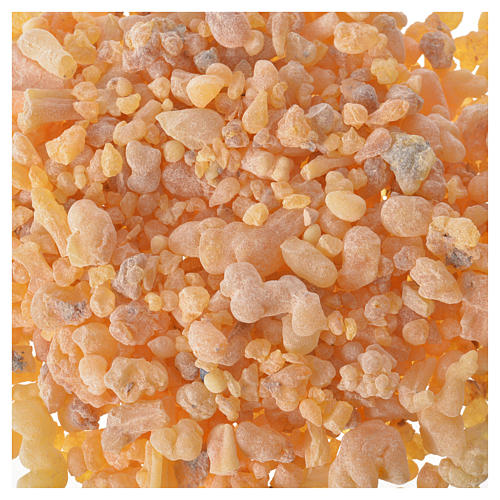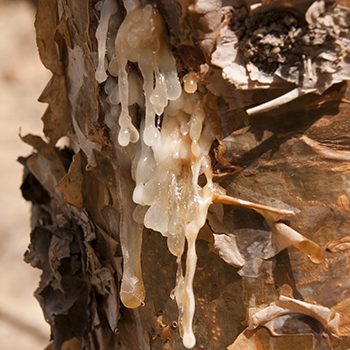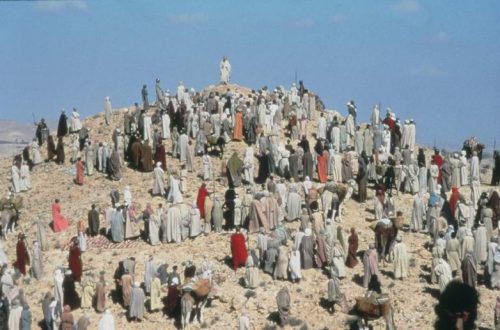
Frankincense
Frankincense was used for incense in the Hebrew sacrificial and offering ceremonies, and it has a sweet smell.
Frankincense

Frankincense, a fragrant gum resin exuded in large, light yellowish-brown tears from Boswellia trees (Boswellia carterii, Boswellia papyrifera, Boswellia thurifera). These grow in South Arabia, Ethiopia, Somalia, and India. Frankincense was imported into Judah by camel caravan from Sheba. (5)
A multitude of camels shall cover you, the young camels of Midian and Ephah; all those from Sheba shall come. They shall bring gold and frankincense, and shall bring good news, the praises of the Lord. (Isaiah 60:6 ESV)
I take no delight when they offer up to me frankincense that comes from Sheba or sweet-smelling cane imported from a faraway land. I cannot accept the burnt offerings they bring me. I get no pleasure from the sacrifices they offer to me.’ (Jeremiah 6:20 NET)
It was used in cosmetics, perfumes, and medicine. Aulus Cornelius Celsus, one of the greatest Roman Medical Writers, described the vast medicinal applications for frankincense, including stopping bleeding, cleaning wounds, curing hemlock poisoning, and others. (2)
Frankincense was also used for incense in the Hebrew sacrificial and offering ceremonies (see table below).

All wheat grain offerings burned on the fire of the Brazen Altar (1) were required to have frankincense put on them.
“ ‘When a person presents a grain offering to the Lord, his offering must consist of choice wheat flour, and he must pour olive oil on it and put frankincense on it. Then he must bring it to the sons of Aaron, the priests, and the priest must scoop out from there a handful of its choice wheat flour and some of its olive oil in addition to all of its frankincense, and the priest must offer its memorial portion up in smoke on the altar—it is a gift of a soothing aroma to the Lord. The remainder of the grain offering belongs to Aaron and to his sons—it is most holy from the gifts of the Lord. (Leviticus 2:1-3 NET)
All barley grain offerings burned on the fire of the Brazen Altar (1) were required to have frankincense put on them.
“ ‘If you present a grain offering of first ripe grain to the Lord, you must present your grain offering of first ripe grain as soft kernels roasted in fire—crushed bits of fresh grain. And you must put olive oil on it and set frankincense on it—it is a grain offering. Then the priest must offer its memorial portion up in smoke—some of its crushed bits, some of its olive oil, in addition to all of its frankincense—it is a gift to the Lord. (Leviticus 2:14–16 NET)
However, no sin or trespass offerings were to have Frankincense placed on them. (Leviticus 5:11) Our sin and trespasses are a stench in the nostrils of God that cannot be covered up with incense. Only the blood (1) of the Lamb of God could eliminate this stench.
The twelve loaves on the Table of Showbread were required to have frankincense on each row, filling the Holy Place with the fragrance of freshly baked bread and frankincense! According to the Rabbis, during the Second Temple, the frankincense was placed in two golden bowls (aka, incense cups or spoons) (Numbers 7:14). These bowls were placed between the two stacks of six showbreads and were used to pour the frankincense on top of the bread. (3) The priests would burn the frankincense on the Brazen Altar and then eat the old showbread in a holy place (i.e., the Outer Court of the Tabernacle (1) (Leviticus 6:16)) on the Sabbath that the new showbread was placed (4) (Leviticus 6:16)).
“You must take choice wheat flour and bake twelve loaves; there must be two tenths of an ephah of flour in each loaf, and you must set them in two rows, six in a row, on the ceremonially pure table before the Lord. You must put pure frankincense on each row, and it will become a memorial portion for the bread, a gift to the Lord. Each Sabbath day Aaron must arrange it before the Lord continually; this portion is from the Israelites as a perpetual covenant. It will belong to Aaron and his sons, and they must eat it in a holy place because it is most holy to him, a perpetual allotted portion from the gifts of the Lord.” (Leviticus 24:5–9 NET)
The incense or perfume for the Golden Altar of Incense (1), located in front of the curtain before the Ark of the Covenant in the Holy Place, contained frankincense. The incense was burned as an “Incense Offering” and only upon the Golden Altar of Incense, twice daily in the morning and around sundown in the evening. (Exodus 30:6-8)
The Lord said to Moses: “Take spices, gum resin, onycha, galbanum, and pure frankincense of equal amountsand make it into an incense, a perfume, the work of a perfumer. It is to be finely ground, and pure and sacred. You are to beat some of it very fine and put some of it before the ark of the testimony in the tent of meeting where I will meet with you; it is to be most holy to you. And the incense that you are to make, you must not make for yourselves using the same recipe; it is to be most holy to you, belonging to the Lord. Whoever makes anything like it, to use as perfume, will be cut off from his people.” (Exodus 30:37–38 NET)
Again, incense was sweet perfume so that, when it was burned, it would go up in smoke; and it pictured a sweet perfume rising up into the nostrils of God. It was an emblem, a symbol of worship, and the Bible tells us that frankincense was to be used in the worship of God alone.
The wise men from the east brought frankincense when they came to worship Jesus emblematic of His pure life. The incense is a picture of Jesus’ life, which manifested the sweet fragrance of perfection in all that He said and did. (Mark 7:37)
As they came into the house and saw the child with Mary his mother, they bowed down and worshiped him. They opened their treasure boxes and gave him gifts of gold, frankincense, and myrrh. (Matthew 2:11 NET)
Frankincense is tapped from scraggly but hardy Boswellia trees by slashing the bark called “striping” allowing the exuded resin to bleed out and harden. These hardened resins are called Frankincense tears.

This typologically depicts the horrendous torture Jesus suffered by slashings and stripes from the whippings and beatings (1) before He suffered the most disgraceful death of crucifixion.
Furthermore, it represents what Jesus is doing for us in the present role as our Great High Priest (1) and Covenant Mediator.
Therefore since we have a great high priest who has passed through the heavens, Jesus the Son of God, let us hold fast to our confession. For we do not have a high priest incapable of sympathizing with our weaknesses, but one who has been tempted in every way just as we are, yet without sin. Therefore let us confidently approach the throne of grace to receive mercy and find grace whenever we need help. (Hebrews 4:14–16 NET)
For here is the testimony about him: “You are a priest forever in the order of Melchizedek. ”On the one hand a former command is set aside because it is weak and useless, for the law made nothing perfect. On the other hand a better hope is introduced, through which we draw near to God. And since this was not done without a sworn affirmation—for the others have become priests without a sworn affirmation, but Jesus did so with a sworn affirmation by the one who said to him, “The Lord has sworn and will not change his mind, ‘You are a priest forever’ ”—accordingly Jesus has become the guarantee of a better covenant. And the others who became priests were numerous, because death prevented them from continuing in office, but he holds his priesthood permanently since he lives forever. So he is able to save completely those who come to God through him, because he always lives to intercede for them. (Hebrews 7:21–25 NET)
Paul alludes to a fragrant offering offered by the sacrificial giving and service of Christians figuratively in the New Covenant.
For I have received everything, and I have plenty. I have all I need because I received from Epaphroditus what you sent — a fragrant offering, an acceptable sacrifice, very pleasing to God. And my God will supply your every need according to his glorious riches in Christ Jesus. May glory be given to God our Father forever and ever. Amen. (Philippians 4:18–20 NET)
We are admonished to follow in the footsteps of Jesus in sacrificially giving, serving, praying, and living a life set apart from the ways of the world.
Therefore, be imitators of God as dearly loved children and live in love, just as Christ also loved us and gave himself for us, a sacrificial and fragrant offering to God. Ephesians (5:1,2 NET)
But thanks be to God who always leads us in triumphal procession in Christ and who makes known through us the fragrance that consists of the knowledge of him in every place. For we are a sweet aroma of Christ to God among those who are being saved and among those who are perishing—to the latter an odor from death to death, but to the former a fragrance from life to life. And who is adequate for these things? (2 Corinthians 2:14–16 NET)
Therefore I exhort you, brothers and sisters, by the mercies of God, to present your bodies as a sacrifice—alive, holy, and pleasing to God—which is your reasonable service. (Romans 12:1 NET)
and when he had taken the scroll, the four living creatures and the twenty-four elders threw themselves to the ground before the Lamb. Each of them had a harp and golden bowls full of incense (which are the prayers of the saints). (Revelation 5:8 NET)
May you accept my prayer like incense, my uplifted hands like the evening offering! (Psalm 141:2 NET)
Amen
Shalom
(Security, Wholeness, Success)
Peace
Then he said to them, “Therefore every expert in the law who has been trained for the kingdom of heaven is like the owner of a house who brings out of his treasure what is new and old.” (Matthew 13:52 NET)
(1) Select the link to open another article with additional information in a new tab.
(2) Beek, Gus W van. “Frankincense and Myrrh.” In pages 113-115 in The Biblical Archaeologist Reader. Vol. 2. Edited by Edward F. Campbell, Jr. and David Noel Freedman. Missoula, Mont.: Scholars Press, 1977.
Knox, J. W. (2016). Frankincense. In J. D. Barry, D. Bomar, D. R. Brown, R. Klippenstein, D. Mangum, C. Sinclair Wolcott, … W. Widder (Eds.), The Lexham Bible Dictionary. Bellingham, WA: Lexham Press.
(3) Neusner, J. (1988). The Mishnah : A new translation (p. 757). New Haven, CT: Yale University Press.
E “The shewbread: its length is ten [handbreadths] and its breadth, five [M. 11:4D1–2]:
F “One sets it lengthwise against the breadth of the table, and two handbreadths on either side [of the bread] does he double [turn up as a wall],
“with two handbreadths space in the middle [between the two sets of six loaves],”
so that the wind blows between them [preventing mould].”
G Abba Saul says, “There [in the open area (F)] did they set the two dishes of frankincense of the shewbread.”
H They said to him, “Has it not already been stated, And you shall put pure frankincense upon each row (Lev. 24:7)?”
I He said to them, “And has it not already been said, And next to him shall be the tribe of Manasseh (Num. 2:20
(4) Edersheim, A. (1959). The Temple, its ministry and services as they were at the time of Jesus Christ. (pp. 185–186). London: James Clarke & Co.
(5) Sweeney, M. A. (2011). frankincense. In M. A. Powell (Ed.), The HarperCollins Bible Dictionary (Revised and Updated) (Third Edition, p. 300). New York: HarperCollins.




